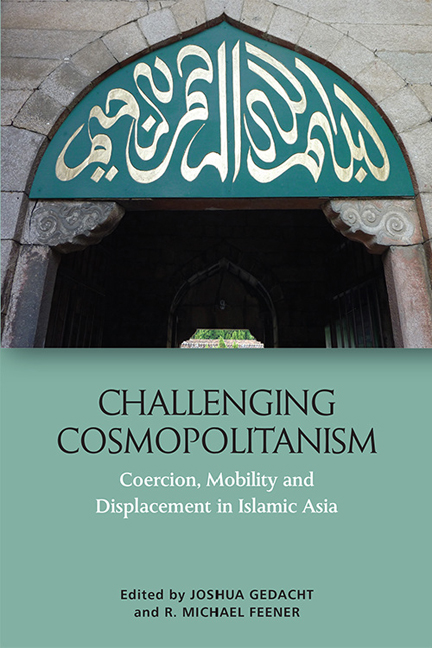Book contents
- Frontmatter
- Contents
- Preface
- 1 Hijra, Ḥajj and Muslim Mobilities: Considering Coercion and Asymmetrical Power Dynamics in Histories of Islamic Cosmopolitanism
- 2 Islamicate Cosmopolitanism from North Africa to Southeast Asia
- 3 Sufi Cosmopolitanism in the Seventeenth-century Indian Ocean: Sharīʿa, Lineage and Royal Power in Southeast Asia and the Maldives
- 4 The White Heron Called by the Muezzin: Shrines, Sufis and Warlords in Early Modern Java
- 5 Variations of ‘Islamic Military Cosmopolitanism’: The Survival Strategies of Hui Muslims during the Modern Period
- 6 Writing Cosmopolitan History in Nineteenth-century China: Li Huanyi’s Words and Deeds of Islamic Exemplars
- 7 The ‘Shaykh al-Islām of the Philippines’ and Coercive Cosmopolitanism in an Age of Global Empire
- 8 Bordering Malaya’s ‘Benighted Lands’: Frontiers of Race and Colonialism on the Malay Peninsula, 1887–1902
- 9 Afghanistan’s Cosmopolitan Trading Networks: A View From Yiwu, China
- Notes on the Contributors
- Index
8 - Bordering Malaya’s ‘Benighted Lands’: Frontiers of Race and Colonialism on the Malay Peninsula, 1887–1902
Published online by Cambridge University Press: 01 May 2021
- Frontmatter
- Contents
- Preface
- 1 Hijra, Ḥajj and Muslim Mobilities: Considering Coercion and Asymmetrical Power Dynamics in Histories of Islamic Cosmopolitanism
- 2 Islamicate Cosmopolitanism from North Africa to Southeast Asia
- 3 Sufi Cosmopolitanism in the Seventeenth-century Indian Ocean: Sharīʿa, Lineage and Royal Power in Southeast Asia and the Maldives
- 4 The White Heron Called by the Muezzin: Shrines, Sufis and Warlords in Early Modern Java
- 5 Variations of ‘Islamic Military Cosmopolitanism’: The Survival Strategies of Hui Muslims during the Modern Period
- 6 Writing Cosmopolitan History in Nineteenth-century China: Li Huanyi’s Words and Deeds of Islamic Exemplars
- 7 The ‘Shaykh al-Islām of the Philippines’ and Coercive Cosmopolitanism in an Age of Global Empire
- 8 Bordering Malaya’s ‘Benighted Lands’: Frontiers of Race and Colonialism on the Malay Peninsula, 1887–1902
- 9 Afghanistan’s Cosmopolitan Trading Networks: A View From Yiwu, China
- Notes on the Contributors
- Index
Summary
Between 1891 and 1895, an armed uprising raged through the dense forest leading in and out of the hinterland of Pahang, a Malay Muslim polity on the east coast of the Malay Peninsula that had established its independence from Johor-Riau some three decades earlier. An offshoot and tributary of Melaka until its Portuguese conquest in 1511, Pahang's allegiance had followed the Melaka royal family to its new seat of power in Johor-Riau, which the Anglo-Dutch Treaty of 1824 later dismembered. Pahang, like Johor and the rest of the Peninsula, fell under Britain's sphere of influence, an assignation that – as Britain adopted a policy of ‘forward movement’ in the 1870s – ceased to operate as a passive British claim, becoming an active process of peninsular colonisation. In the late 1880s, after installing British Residents in Perak, Selangor and parts of Negeri Sembilan, Britain colonised Pahang, beginning with a treaty that installed a British Agent in 1887, followed by a Resident in 1888. This move ‘consolidated British influence over the whole Peninsula east and west’, as Frederick Weld, Governor of the Straits Settlements, stated in 1887, with the additional effect that British territory now abutted Siamese tributaries across the width of the Peninsula.
This arrangement triggered a slow and subtle contest for these tributaries – polities where Britain recognised that Siam ‘claim[ed] a right of interference’ but not of sovereignty – the southernmost of which were Kedah, Kelantan and Terengganu. Since leasing Penang Island from Kedah in 1786, the British had become amply familiar with Kedah's internal politics and relations with Siam, and now, from their new vantage point in Pahang, they had also gained an opportunity to observe Kelantan and Terengganu more closely than ever before. British officials worked to extend the reach of Pahang's new colonial state from its capital Pekan across its forested hinterland, whose extremities they aimed to secure, and whose human relationships they began to reshape. The new colonial state restructured local models of territoriality and practices of resource management, diverting the revenue streams of Pahang's hinterland chiefs, who had previously commanded access to land, cultivated goods, forest products and labour. In response to this intervention, in 1890 the district chief of Semantan, Dato’ Bahaman, began to resist all cooperation with the British.
- Type
- Chapter
- Information
- Challenging CosmopolitanismCoercion, Mobility and Displacement in Islamic Asia, pp. 203 - 224Publisher: Edinburgh University PressPrint publication year: 2018



